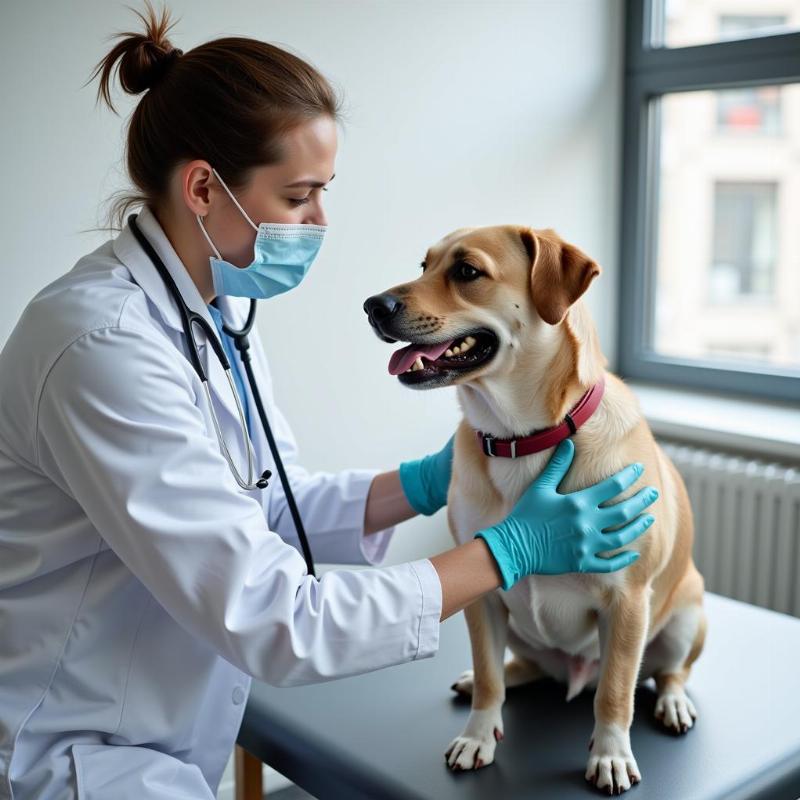If your dog just devoured a deceased squirrel, you’re likely experiencing a mix of disgust and concern. This is a common, albeit unpleasant, situation for dog owners, especially in squirrel-rich environments like many parts of the US. Knowing what steps to take can help protect your dog’s health and give you peace of mind. This article will guide you through everything you need to know, from immediate actions to potential risks and preventative measures.
Understanding the Risks of Eating a Dead Squirrel
Why is eating a dead squirrel dangerous for dogs? Several risks are associated with this behavior. Firstly, squirrels can carry diseases and parasites, such as leptospirosis, tularemia, and roundworms, which can be transmitted to your dog through ingestion. Secondly, the decaying process of the squirrel can lead to the growth of bacteria that produce toxins harmful to your dog. Finally, if the squirrel was poisoned (e.g., by rodenticide), your dog could ingest these toxins as well.
Immediate Actions After Your Dog Eats a Dead Squirrel
What should you do if your dog eats a dead squirrel? First, try to remove any remaining squirrel parts from your dog’s mouth. Then, contact your veterinarian immediately. Provide them with as much information as possible, including the approximate size of the squirrel, how long ago your dog ate it, and any symptoms your dog is displaying. Your vet can advise you on the best course of action, which might include inducing vomiting or monitoring your dog for specific symptoms.
Signs and Symptoms to Watch For
After your dog ingests a dead squirrel, it’s crucial to monitor them for any signs of illness. These can include vomiting, diarrhea, lethargy, loss of appetite, fever, jaundice (yellowing of the gums and eyes), or neurological symptoms such as tremors or seizures. If you notice any of these symptoms, contact your veterinarian immediately. Early intervention is key to mitigating potential health issues.
Preventing Future Incidents
Prevention is always the best approach. While it’s impossible to completely eliminate the risk of your dog encountering a dead squirrel, you can take steps to minimize it. Regularly inspect your yard for dead animals and remove them promptly. Train your dog to respond to commands like “leave it” or “drop it.” This can be achieved through consistent training and positive reinforcement. A well-trained dog is more likely to obey your commands and avoid scavenging. Consider using a muzzle on walks, especially in areas where squirrels are prevalent.
Long-Term Health Concerns
If your dog has ingested a poisoned squirrel, the long-term health concerns can be significant, potentially involving liver or kidney damage. Regular veterinary checkups are essential for monitoring your dog’s health and detecting any potential long-term effects. Your vet may recommend blood tests or other diagnostic procedures to assess organ function and overall health.
 Bác sĩ thú y kiểm tra chó
Bác sĩ thú y kiểm tra chó
What about Cooked Squirrel?
While the focus of this article is on dead squirrels, it’s worth noting that feeding your dog cooked squirrel meat carries different risks. While not inherently toxic, cooked squirrel bones can splinter and cause internal injuries. Moreover, unless the squirrel is part of a balanced, vet-approved diet, it may lack essential nutrients.
Conclusion
Discovering your dog ate a dead squirrel can be a distressing experience. By understanding the potential risks, taking prompt action, and implementing preventative measures, you can protect your dog’s health and well-being. Remember to contact your veterinarian immediately if your dog consumes a dead squirrel, and always prioritize preventative training and responsible pet ownership.
FAQ
- What is the most serious risk of a dog eating a dead squirrel? Ingestion of poison or contracting a serious disease like leptospirosis are the most serious risks.
- Should I induce vomiting if my dog eats a dead squirrel? Never induce vomiting without consulting your veterinarian first. They will advise you on the best course of action based on your dog’s specific situation.
- How can I train my dog to “leave it”? Consistent positive reinforcement training using treats and praise is the most effective method.
- Are there any long-term health effects from eating a dead squirrel? Yes, particularly if the squirrel was poisoned. Regular veterinary checkups are crucial.
- Is it safe to feed my dog cooked squirrel meat? Cooked squirrel meat without bones can be given in moderation, but it shouldn’t replace a balanced, vet-approved diet.
- What are the symptoms of leptospirosis in dogs? Symptoms can include fever, lethargy, muscle pain, vomiting, diarrhea, jaundice, and increased thirst and urination.
- How can I prevent my dog from eating dead animals in my yard? Regularly inspect and clean your yard, train your dog to “leave it,” and consider using a muzzle on walks.
Beautdogs.us – your trusted source for comprehensive dog care information in the US. We provide expert guidance on various dog breeds, from the common to the rare, along with in-depth knowledge of health care, nutrition, and training. Our platform offers practical advice on responsible pet ownership, including legal matters and financial planning. We also review and recommend quality pet products, from food to grooming supplies. Whether you’re a new dog owner or a seasoned one, Beautdogs.us is your go-to destination for all things canine. When you need assistance, please contact us at Email: [email protected] for detailed and accurate answers.